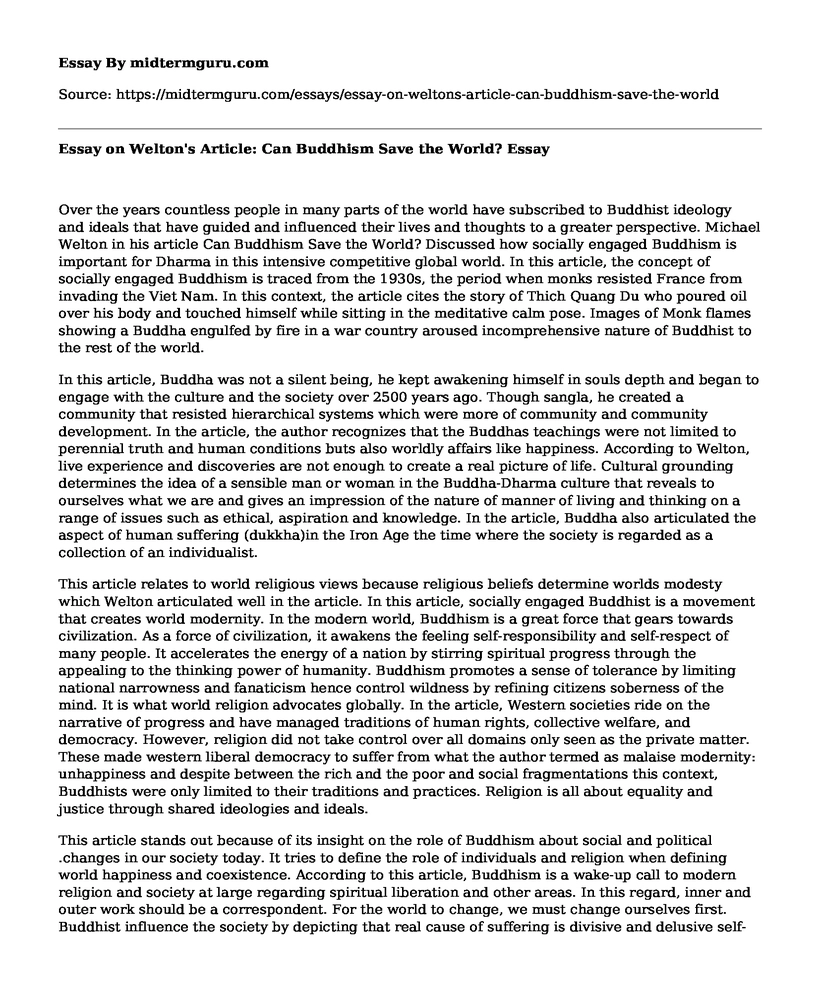Over the years countless people in many parts of the world have subscribed to Buddhist ideology and ideals that have guided and influenced their lives and thoughts to a greater perspective. Michael Welton in his article Can Buddhism Save the World? Discussed how socially engaged Buddhism is important for Dharma in this intensive competitive global world. In this article, the concept of socially engaged Buddhism is traced from the 1930s, the period when monks resisted France from invading the Viet Nam. In this context, the article cites the story of Thich Quang Du who poured oil over his body and touched himself while sitting in the meditative calm pose. Images of Monk flames showing a Buddha engulfed by fire in a war country aroused incomprehensive nature of Buddhist to the rest of the world.
In this article, Buddha was not a silent being, he kept awakening himself in souls depth and began to engage with the culture and the society over 2500 years ago. Though sangla, he created a community that resisted hierarchical systems which were more of community and community development. In the article, the author recognizes that the Buddhas teachings were not limited to perennial truth and human conditions buts also worldly affairs like happiness. According to Welton, live experience and discoveries are not enough to create a real picture of life. Cultural grounding determines the idea of a sensible man or woman in the Buddha-Dharma culture that reveals to ourselves what we are and gives an impression of the nature of manner of living and thinking on a range of issues such as ethical, aspiration and knowledge. In the article, Buddha also articulated the aspect of human suffering (dukkha)in the Iron Age the time where the society is regarded as a collection of an individualist.
This article relates to world religious views because religious beliefs determine worlds modesty which Welton articulated well in the article. In this article, socially engaged Buddhist is a movement that creates world modernity. In the modern world, Buddhism is a great force that gears towards civilization. As a force of civilization, it awakens the feeling self-responsibility and self-respect of many people. It accelerates the energy of a nation by stirring spiritual progress through the appealing to the thinking power of humanity. Buddhism promotes a sense of tolerance by limiting national narrowness and fanaticism hence control wildness by refining citizens soberness of the mind. It is what world religion advocates globally. In the article, Western societies ride on the narrative of progress and have managed traditions of human rights, collective welfare, and democracy. However, religion did not take control over all domains only seen as the private matter. These made western liberal democracy to suffer from what the author termed as malaise modernity: unhappiness and despite between the rich and the poor and social fragmentations this context, Buddhists were only limited to their traditions and practices. Religion is all about equality and justice through shared ideologies and ideals.
This article stands out because of its insight on the role of Buddhism about social and political .changes in our society today. It tries to define the role of individuals and religion when defining world happiness and coexistence. According to this article, Buddhism is a wake-up call to modern religion and society at large regarding spiritual liberation and other areas. In this regard, inner and outer work should be a correspondent. For the world to change, we must change ourselves first. Buddhist influence the society by depicting that real cause of suffering is divisive and delusive self-need and that the community exists in a social-historical condition that institutionalizes alienation and acquisitiveness. Unfortunately, these conditions are passed to generations after generation.
It is interesting in the e article how the author identifies Poisons of Buddhism: greed, anger, and delusion, which we need to get rid of from our daily lives through social and political realities. It is also interesting how he further notes that systems of the world are causing suffering today just like psychological factors. In this regard, social structures and ideological systems are part of institutionalized poisons that Buddhists try to address through enlighten
Work Cited
Michael, Welton.Can Buddhism Save the World? Counterpunch. (2016) Web 13. Jan.2017
Cite this page
Essay on Welton's Article: Can Buddhism Save the World?. (2021, May 28). Retrieved from https://midtermguru.com/essays/essay-on-weltons-article-can-buddhism-save-the-world
If you are the original author of this essay and no longer wish to have it published on the midtermguru.com website, please click below to request its removal:
- Paper Sample on the Roman Catholic Church
- Buddha's Enlightenment - Essay Example
- Essay on Islamic Art and Architecture
- Essay on Functions of the Buddha in Buddhism
- Essay Sample About the God Zeus
- Essay Sample on Pre-Islamic World: Prophet Mohammed and Qur'an
- The Pilgrim's Progress - Critical Essay Sample







